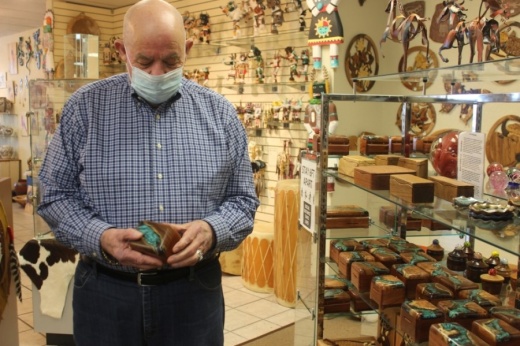Williamson’s interest in Southwestern pottery and art began as a teenager working summers at a ranch near Taos, a hub for Pueblo artists.
“On our days off, we’d go into Taos and hang out at the art galleries,” he said. “I got to know some of the artists during those four summers. It was just lots of fun, and that was in the days when turquoise really was hot.”
Williamson began Turquoise Trading Post in North Central Austin in 1994 with a friend, a Navajo jewelry maker. While Williamson’s partner moved on to other ventures, authentic Native American jewelry is still the cornerstone of his business, accounting for about 75% of sales, he said.
From the ’90s to now, the jewelry selection has grown by leaps and bounds: At first, Turquoise Trading Post offered about 10 different ring designs. Today, it offers thousands of pieces by around 200 Navajo, Zuni, Hopi and Santo Domingo artists, many of whom Williamson has traveled to meet in person. According to Williamson, it is the largest selection of Native jewelry in Texas, housed in a space three times the size of Turquoise Trading Post’s original 1994 location.
Turquoise Trading Post also offers a variety of Native pottery as well as other Southwest-inspired gifts and art made by local artisans in and around the Texas Hill Country. But Williamson said he and his staff make a point of telling people the difference.
“We tell people what’s what,” he said. “We don’t try to pass it off as Native-made if it’s not.”
Like most small businesses, Turquoise Trading Post has faced challenges during the coronavirus pandemic. When local shelter-in-place orders caused the shop to shut down last March for around a month, Turquoise Trading Post set up an Etsy page to keep sales going online. But throughout the challenging year of 2020, Williamson said it was the store’s dedicated base of regulars who kept it in business.
“[Loyal customers] are all we have,” Williamson said.





